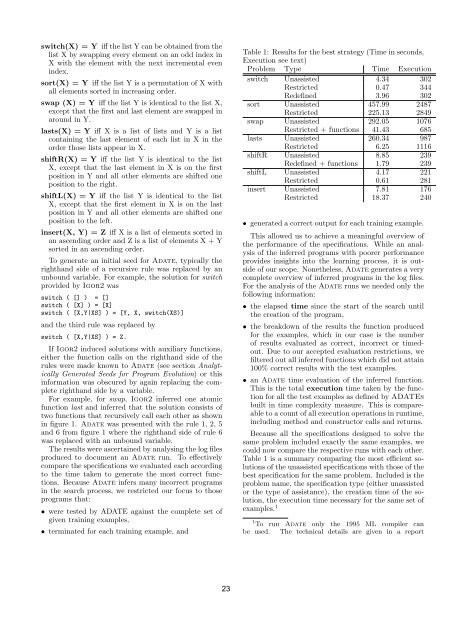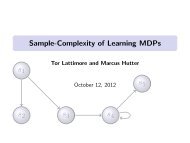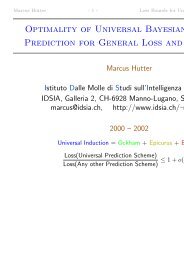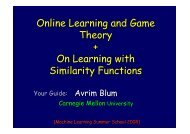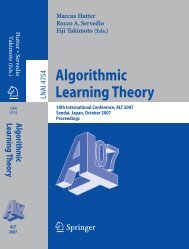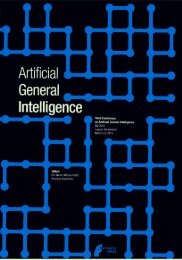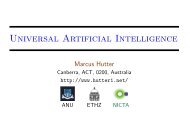A Framework for Evaluating Early-Stage Human - of Marcus Hutter
A Framework for Evaluating Early-Stage Human - of Marcus Hutter
A Framework for Evaluating Early-Stage Human - of Marcus Hutter
Create successful ePaper yourself
Turn your PDF publications into a flip-book with our unique Google optimized e-Paper software.
switch(X) = Y iff the list Y can be obtained from the<br />
list X by swapping every element on an odd index in<br />
X with the element with the next incremental even<br />
index.<br />
sort(X) = Y iff the list Y is a permutation <strong>of</strong> X with<br />
all elements sorted in increasing order.<br />
swap (X) = Y iff the list Y is identical to the list X,<br />
except that the first and last element are swapped in<br />
around in Y.<br />
lasts(X) = Y iff X is a list <strong>of</strong> lists and Y is a list<br />
containing the last element <strong>of</strong> each list in X in the<br />
order those lists appear in X.<br />
shiftR(X) = Y iff the list Y is identical to the list<br />
X, except that the last element in X is on the first<br />
position in Y and all other elements are shifted one<br />
position to the right.<br />
shiftL(X) = Y iff the list Y is identical to the list<br />
X, except that the first element in X is on the last<br />
position in Y and all other elements are shifted one<br />
position to the left.<br />
insert(X, Y) = Z iff X is a list <strong>of</strong> elements sorted in<br />
an ascending order and Z is a list <strong>of</strong> elements X + Y<br />
sorted in an ascending order.<br />
To generate an initial seed <strong>for</strong> Adate, typically the<br />
righthand side <strong>of</strong> a recursive rule was replaced by an<br />
unbound variable. For example, the solution <strong>for</strong> switch<br />
provided by Igor2 was<br />
switch ( [] ) = []<br />
switch ( [X] ) = [X]<br />
switch ( [X,Y|XS] ) = [Y, X, switch(XS)]<br />
and the third rule was replaced by<br />
switch ( [X,Y|XS] ) = Z.<br />
If Igor2 induced solutions with auxiliary functions,<br />
either the function calls on the righthand side <strong>of</strong> the<br />
rules were made known to Adate (see section Analytically<br />
Generated Seeds <strong>for</strong> Program Evolution) or this<br />
in<strong>for</strong>mation was obscured by again replacing the complete<br />
righthand side by a variable.<br />
For example, <strong>for</strong> swap, Igor2 inferred one atomic<br />
function last and inferred that the solution consists <strong>of</strong><br />
two functions that recursively call each other as shown<br />
in figure 1. Adate was presented with the rule 1, 2, 5<br />
and 6 from figure 1 where the righthand side <strong>of</strong> rule 6<br />
was replaced with an unbound variable.<br />
The results were ascertained by analysing the log files<br />
produced to document an Adate run. To effectively<br />
compare the specifications we evaluated each according<br />
to the time taken to generate the most correct functions.<br />
Because Adate infers many incorrect programs<br />
in the search process, we restricted our focus to those<br />
programs that:<br />
• were tested by ADATE against the complete set <strong>of</strong><br />
given training examples,<br />
• terminated <strong>for</strong> each training example, and<br />
23<br />
Table 1: Results <strong>for</strong> the best strategy (Time in seconds,<br />
Execution see text)<br />
Problem Type Time Execution<br />
switch Unassisted 4.34 302<br />
Restricted 0.47 344<br />
Redefined 3.96 302<br />
sort Unassisted 457.99 2487<br />
Restricted 225.13 2849<br />
swap Unassisted 292.05 1076<br />
Restricted + functions 41.43 685<br />
lasts Unassisted 260.34 987<br />
Restricted 6.25 1116<br />
shiftR Unassisted 8.85 239<br />
Redefined + functions 1.79 239<br />
shiftL Unassisted 4.17 221<br />
Restricted 0.61 281<br />
insert Unassisted 7.81 176<br />
Restricted 18.37 240<br />
• generated a correct output <strong>for</strong> each training example.<br />
This allowed us to achieve a meaningful overview <strong>of</strong><br />
the per<strong>for</strong>mance <strong>of</strong> the specifications. While an analysis<br />
<strong>of</strong> the inferred programs with poorer per<strong>for</strong>mance<br />
provides insights into the learning process, it is outside<br />
<strong>of</strong> our scope. Nonetheless, Adate generates a very<br />
complete overview <strong>of</strong> inferred programs in the log files.<br />
For the analysis <strong>of</strong> the Adate runs we needed only the<br />
following in<strong>for</strong>mation:<br />
• the elapsed time since the start <strong>of</strong> the search until<br />
the creation <strong>of</strong> the program,<br />
• the breakdown <strong>of</strong> the results the function produced<br />
<strong>for</strong> the examples, which in our case is the number<br />
<strong>of</strong> results evaluated as correct, incorrect or timedout.<br />
Due to our accepted evaluation restrictions, we<br />
filtered out all inferred functions which did not attain<br />
100% correct results with the test examples.<br />
• an Adate time evaluation <strong>of</strong> the inferred function.<br />
This is the total execution time taken by the function<br />
<strong>for</strong> all the test examples as defined by ADATEs<br />
built in time complexity measure. This is compareable<br />
to a count <strong>of</strong> all execution operations in runtime,<br />
including method and constructor calls and returns.<br />
Because all the specifications designed to solve the<br />
same problem included exactly the same examples, we<br />
could now compare the respective runs with each other.<br />
Table 1 is a summary comparing the most efficient solutions<br />
<strong>of</strong> the unassisted specifications with those <strong>of</strong> the<br />
best specification <strong>for</strong> the same problem. Included is the<br />
problem name, the specification type (either unassisted<br />
or the type <strong>of</strong> assistance), the creation time <strong>of</strong> the solution,<br />
the execution time necessary <strong>for</strong> the same set <strong>of</strong><br />
examples. 1<br />
1 To run Adate only the 1995 ML compiler can<br />
be used. The technical details are given in a report


